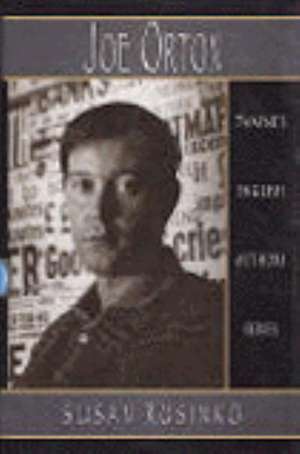English Authors Series: Joe Orton: Twayne's English Authors, cartea 0515
Autor Susan Rusinkoen Limba Engleză Hardback – 31 aug 1995
Din seria Twayne's English Authors
-
 Preț: 376.19 lei
Preț: 376.19 lei -
 Preț: 461.64 lei
Preț: 461.64 lei -
 Preț: 377.72 lei
Preț: 377.72 lei -
 Preț: 463.17 lei
Preț: 463.17 lei -
 Preț: 375.22 lei
Preț: 375.22 lei -
 Preț: 463.93 lei
Preț: 463.93 lei -
 Preț: 463.55 lei
Preț: 463.55 lei -
 Preț: 462.79 lei
Preț: 462.79 lei -
 Preț: 371.94 lei
Preț: 371.94 lei -
 Preț: 372.93 lei
Preț: 372.93 lei -
 Preț: 374.45 lei
Preț: 374.45 lei -
 Preț: 463.55 lei
Preț: 463.55 lei -
 Preț: 373.47 lei
Preț: 373.47 lei -
 Preț: 485.68 lei
Preț: 485.68 lei -
 Preț: 373.47 lei
Preț: 373.47 lei -
 Preț: 374.62 lei
Preț: 374.62 lei -
 Preț: 372.50 lei
Preț: 372.50 lei -
 Preț: 376.19 lei
Preț: 376.19 lei -
 Preț: 465.13 lei
Preț: 465.13 lei -
 Preț: 375.98 lei
Preț: 375.98 lei -
 Preț: 376.19 lei
Preț: 376.19 lei -
 Preț: 465.89 lei
Preț: 465.89 lei -
 Preț: 464.36 lei
Preț: 464.36 lei -
 Preț: 377.13 lei
Preț: 377.13 lei -
 Preț: 485.90 lei
Preț: 485.90 lei -
 Preț: 376.75 lei
Preț: 376.75 lei -
 Preț: 374.84 lei
Preț: 374.84 lei -
 Preț: 340.22 lei
Preț: 340.22 lei -
 Preț: 485.51 lei
Preț: 485.51 lei -
 Preț: 487.81 lei
Preț: 487.81 lei -
 Preț: 483.38 lei
Preț: 483.38 lei -
 Preț: 461.86 lei
Preț: 461.86 lei -
 Preț: 486.06 lei
Preț: 486.06 lei -
 Preț: 487.25 lei
Preț: 487.25 lei -
 Preț: 487.25 lei
Preț: 487.25 lei -
 Preț: 487.04 lei
Preț: 487.04 lei -
 Preț: 486.49 lei
Preț: 486.49 lei -
 Preț: 487.25 lei
Preț: 487.25 lei -
 Preț: 483.99 lei
Preț: 483.99 lei -
 Preț: 487.42 lei
Preț: 487.42 lei -
 Preț: 487.25 lei
Preț: 487.25 lei -
 Preț: 483.60 lei
Preț: 483.60 lei -
 Preț: 486.49 lei
Preț: 486.49 lei -
 Preț: 484.75 lei
Preț: 484.75 lei -
 Preț: 492.81 lei
Preț: 492.81 lei -
 Preț: 488.19 lei
Preț: 488.19 lei - 23%
 Preț: 500.03 lei
Preț: 500.03 lei -
 Preț: 484.75 lei
Preț: 484.75 lei -
 Preț: 486.28 lei
Preț: 486.28 lei
Preț: 528.27 lei
Nou
Puncte Express: 792
Preț estimativ în valută:
101.10€ • 105.27$ • 85.44£
101.10€ • 105.27$ • 85.44£
Carte indisponibilă temporar
Doresc să fiu notificat când acest titlu va fi disponibil:
Se trimite...
Preluare comenzi: 021 569.72.76
Specificații
ISBN-13: 9780805770346
ISBN-10: 0805770348
Pagini: 137
Dimensiuni: 147 x 224 x 18 mm
Greutate: 0.33 kg
Ediția:New.
Editura: Twayne Publishers
Seria Twayne's English Authors
ISBN-10: 0805770348
Pagini: 137
Dimensiuni: 147 x 224 x 18 mm
Greutate: 0.33 kg
Ediția:New.
Editura: Twayne Publishers
Seria Twayne's English Authors
Textul de pe ultima copertă
In this penetrating analysis of Orton's writing, Susan Rusinko uses as a point of departure the image of Orton as clown and trickster, following in the tradition of the Lord of Misrule. She intersperses her analysis of Orton's three landmark plays with commentary on his four short plays for radio and television (two later revised for the stage), his posthumously published novel, his published but unproduced film script for the Beatles, his sketch for Kenneth Tynan's Oh, Calcutta!, and his renowned Diaries, published posthumously in 1986, wherein much of the nature of his outsider's take on society is revealed. Rusinko argues that Orton, Pinter, and Stoppard belong to the tradition of James Joyce and Samuel Beckett, as reinvigorators of stage language not in evidence since the Renaissance. She places Orton in the rebellious tradition of such writers as Ben Jonson, Christopher Marlowe, William Wycherley, and William Congreve, noting that, like that of the emigres Joyce and Beckett, Orton's rebellion took shape only when, at the age of 17, he left his middle-class hometown of Leicester for good.
